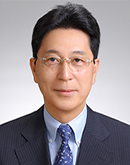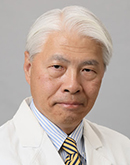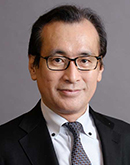Greeting
Hideyuki Shimizu M.D., Ph.D.
Professor and Chairman
Department of Surgery(Cardiovascular Surgery)
Keio University School of Medicine

I would like to express my sincere gratitude to all the members for giving me the opportunity to be the president of the 74th Annual Meeting of the Japanese Association for Thoracic Surgery. With the guidance and cooperation of many people, including the program committee members, my colleagues are working diligently to prepare the meeting along with Professor Hisao Asamura (thoracic surgery), Professor Yuko Kitagawa (esophageal surgery) and the secretaries.
The theme of the 74th Annual Meeting of the Japanese Association for Thoracic Surgery is “SHAPING OUR FUTURE”. This is based on the teaching of Yukichi Fukuzawa, the founder of Keio University; Amid the chaos of the final days of the Edo Period, Keio Gijuku students carried on with their studies of Dutch economic textbooks, even as they heard the echoes of gunfire in the distance from battles between samurai loyal to the Tokugawa Shogun (the old government) and Imperial forces (the new government). Fukuzawa rallied his students, telling them: “Whatever happens in the country, whatever warfare harasses our land, we have never relinquished our hold on Western learning. As long as this school of ours stands, Japan remains a civilized nation of the world…there is no need to concern ourselves with the wayward trend of society.” Look to the future, he said. Don’ t look to today, but look to shape our future today.
In order to pursue more advanced surgical treatment, we must continue our constant efforts to acquire the latest knowledge and skills without being satisfied with the current situation. It is also important to objectively verify various treatment methods, determine their value, and if they are excellent, actively incorporate and disseminate them. In addition, it is necessary to gather wisdom to solve various issues such as new coronavirus infection, reduction of surgeons, and response to work style reform, and to prepare an environment for strong progress.
I strongly desire to make it a meaningful academic meeting to rethink what we need to do now to realize a bright future and to move forward to shape our future correctly. I superimposed my thoughts on the phrase "SHAPING OUR FUTURE".
The Japanese Association for Thoracic Surgery has contributed to the academic development of the field of thoracic surgery, improvement of medical safety, and training of younger generations, and has realized and led it. By sharing up-to-date information and lively discussions in the fields of cardiovascular surgery, respiratory surgery and esophageal surgery, we will improve education and medical care and promote international exchange as a regular academic meeting of the leading society. In order to achieve this goal, I would like to take advantage of the fact that the chairpersons of the three fields belong to the same university, and play a firm role while further deepening the bonds between the three fields.
The meeting will be held for 4 days from October 31st (Sunday) to November 3rd (Wednesday), 2021, and the venue will be Grand Prince Hotel New Takanawa. The situation is fluid due to COVID-19, but we will aim for a fruitful academic meeting with an eye on the future under any circumstances, so please join us and apply for a wonderful presentation.
I sincerely hope for the earliest possible convergence of the new coronavirus infection and look forward to seeing you in Tokyo.
Hisao Asamura M.D., Ph.D.
Professor and Chairman
Department of Surgery(General Thoracic Surgery)
Keio University School of Medicine

Dear fellow members:
I am deeply honored to be appointed as a Congress President (Thoracic Surgery) at the 74th Annual Scientific Meeting of the Japanese Association for Thoracic Surgery. I very much look forward to learning about new research and fostering a vibrant scholarly conversation between our members. Today, as the coronavirus continues to rage around the world, scientists and laymen alike are increasingly convinced of the power of science to change the world. Though taken for granted, building and disseminating knowledge through scholarly conferences and professional gatherings is key to a brighter future of medicine.
Precisely for this reason, starting this year the JATS has begun selecting one president from each division, which enables us to avoid redundancies, take on bigger issues, and take a more holistic approach to the two annual spring and fall Thoracic Surgery conferences. Unfortunately, we were unable to reflect the new arrangement when designing the spring conference program, but as we plan for the 74th JATS conference, we seek to better integrate the two conferences to provide an enriching experience as a whole.
Back in 2017, I was fortunate to serve as the Congress President for the IASLC (International Association for the Study of Lung Cancer) World Conference on Lung Cancer and the Annual meeting of the Japan Lung Cancer Society in Yokohama, where surgeons, physicians, pathologists from all around the world came together to discuss cutting-edge research and share ideas and time together in one place in a face-to-face manner, which belonged to the meetings of “pre-coronavirus” era.
Personally, I do not think emerging online technologies dramatically change or enhance the essence of scholarly conferences―whether online or offline, together, we aim to propel our scientific community in a new direction through annual discussions. And more importantly, the true value of the conference lies in its ability to provide many opportunities to network with like-minded peers and exchange valuable information. Just as the development of advanced recording technologies or SNS cannot beat the live music performances at the concert hall, human interaction remains crucial to nurture a close-knit community of aspiring surgeons.
And yet, the global pandemic has created a set of unprecedented issues that undermine such value of scholarly conferences. We constantly face uncertainties regarding the possibility to host the event virtually or in-person, which depends entirely on the coronavirus situation of the moment.
Nonetheless, we must face the new normalcy with the hope that, someday, all of us will once again come together and participate in lively discussions at the conference. I will do my best to prepare for the conference in order to build a new milestone in our long history of thoracic surgery. Finally, I would like to thank all of those working hard to make the 74th Conference possible in this difficult time.
Yuko Kitagawa M.D., Ph.D.
Professor and Chairman
Department of Surgery
(General and Gastroenterological Surgery)
Keio University School of Medicine

I am extremely honored to serve as the Chairperson of Esophageal Surgery for the 74th Annual Scientific Meeting of the Japanese Association for Thoracic Surgery.
It is also an immense honor to be part of the three-person team presiding over this tradition-steeped annual meeting—Congress President Dr. Hideyuki Shimizu, Chairperson of Thoracic Surgery Dr. Hisao Asamura, and I, their fellow member of the Keio University School of Medicine’s Department of Surgery. Last year, our department celebrated its 100th anniversary, and with this year we begin the journey through our next 100 years. I am very grateful to all the members of our Association for granting me the opportunity to serve in this position in such a milestone year.
Today’s medical science community is crowded with a broad array of societies, associations, and study groups. As a result, the content of different scientific meetings can often be redundant, and it sometimes feels as if participating in those many meetings has become part of the job description for surgeons. In the midst of such an environment, it has become vital for us, under the strong leadership of President Dr. Yoshiki Sawa, to maximize the singular and distinctive qualities that define the field of thoracic surgery. As one example of our efforts in esophageal medicine, we have closely coordinated our meeting planning with the Japan Esophageal Society, a scientific association that broadly covers esophageal diseases, in order to create a meaningful program that does not overlap with the one for the 75th Annual Meeting of the Japan Esophageal Society, which will be held in September 2021 and presided over by Dr. Katsuhiko Iwakiri (Department of Gastroenterology, Nippon Medical School).
Surgical management of thoraco-mediastinal advanced cancer, which is designed as symposium spanning diverse areas of thoracic surgery, promises to offer dynamic presentations of a caliber that only JATS can deliver. Even in today’s era of multidisciplinary cancer therapy, surgery remains the last bastion against late-stage or intractable cancer, and it is a critical challenge for us to apply our broad thoracic surgery knowledge, experience, and technologies to this area of medicine. The panel discussion, standardization of robot-assisted surgery for esophageal cancer, will examine whether robot-assisted surgery, which has recently been advancing in many fields but still globally lacks a large body of evidence, can be a solution for challenges such as reducing complications following esophageal cancer surgery, and improving prognosis by enhancing local control. At the same time, the discussion will likely help us to identify other challenges deserving scientific exploration in the years ahead. The workshop will address a topic that has long escaped in-depth discussion, namely, how to assess and improve long-term QOL following post-esophagectomy reconstruction. We will also leverage our past experiences and outcomes in a lively debate over the question of which organ to use for post-gastrectomy reconstruction when the stomach tube cannot be used—the long-standing standard alternative of the colon, or the small intestine. We will also learn about cutting-edge insights and techniques in cardiovascular and respiratory medicine, two domains that, due to the increasing specialization and compartmentalization of healthcare, are “near, yet far away” for esophageal surgeons. This, I believe, will inspire us to pursue new challenges and further advance our craft. I very much look forward to everyone’s avid participation in the meeting.
© 2021 The 74th Annual Scientific Meeting of the Japanese Association for Thoracic Surgery

